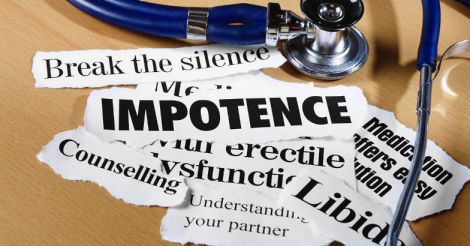Impotence has been called a man’s problem and a woman’s despair. And, for both, the man and the woman, there is much more lost than just the obvious. Impotence can be a relationship killer.
A big part of the reason is that impotence (today more politically correctly called erectile dysfunction, or ED) continues to be considered – unfortunately, even by most Indian healthcare professionals – as the man’s problem and his alone. Most men who suffer from impotence don’t even want to talk to their partner about it. The main reason is that the man feels ashamed, and feels it is something he has to deal with himself. In many cases, he is too embarrassed even to seek professional help and ends up “coping” with the problem by avoiding sexual contact altogether. If a man does go to a therapist, he is, more often than not, against his partner coming in to therapy with him.
But leaving the woman out of the equation sidelines the enormous impact that a man’s impotence has on his partner. A woman whose partner is impotent may feel unloved or unsexy, or she may feel that the romantic spark in her relationship has faded. Reluctant to appear selfish or insensitive, she may hesitate to ask her partner to satisfy her sexual needs in other ways. There is also, for the woman, the fear that there is something seriously wrong with her man – that he must be suffering from diabetes, or working too hard.
Yet, many men can regain their potency, and those who can’t can nonetheless enjoy giving their partners sexual satisfaction. An impotent man can still be a very effective lover. With a little knowledge and creativity, it’s possible to keep impotence from ruining your love life – and your relationship.
An occasional performance failure is not impotence
 Photo: Getty Images
Photo: Getty ImagesWhen a man who has never had problems in bed is suddenly unable to perform, it’s difficult for his partner not to feel it’s somehow her fault. She may wonder, “What’s the matter with me? Am I too fat or too old?” It is far from unusual for some women to even suspect their husbands of having affairs.
In reality, a random episode of impotence, whether in a new or a long-time partner, usually has little to do with how a man feels about the woman lying next to him in bed. He may be worrying about something he forgot to do at the office, or about some discrepancy in his bank account. A man may even lose an erection if a partner moans or groans during sex and he’s distracted.
The fact is, all men, at some now-and-then times in their life, experience problems with attaining an erection, or with a prematurely ebbing erection. These occasional performance failures do not define a man as impotent. A man is considered impotent when he is unable to sexually perform on multiple occasions. Medically, ED is diagnosed if a man fails to maintain an erection satisfactory for intercourse on at least 25 % of attempts. In other words, “impotence” is an ongoing problem that raises repeated concern.
So, if it’s just an occasional occurrence, ignore it – the problem will generally resolve itself. Obsessing over it is likely to be counter-productive; by bringing on performance anxiety, it can lead to a vicious cycle. An erection is a reflex event. A man can’t will it to happen, and the more anxious he gets, the less likely it is that he will have an erection. The result is a sexual death spiral: The man obsesses about his failure, which makes him anxious and unable to achieve an erection the next time he’s in bed with you, which sparks further anxiety, and so on. Eventually, it can put a damper on all intimacy because the man fears that any kind of closeness might lead to a failure in performance, which he cannot bear to see happen.
What to do when the problem becomes a pattern
 Photo: Getty Images
Photo: Getty ImagesIf you and your partner have an otherwise healthy sex life, an occasional vanishing erection isn’t likely to faze either of you. But chronic troubles can quickly erode a sexual bond.
Up to about a few decades ago, doctors blamed most chronic impotence on psychological factors. Today, there has been a shift in perspective: we now know that psychological troubles are the primary cause for chronic impotence only about 10 per cent of the time, usually in men under age 40.
When a couple is emotionally estranged, stored-up anger may derail an erection. You can’t make love and war at the same time.
Fertility anxiety is another psychological cause of impotence in younger men. The prospect of fatherhood can be stressful, as can the pressure of having to perform sexually during a woman’s most fertile periods.
The majority of impotence cases have a physical root, however, rather than a psychological one. Lifestyle habits such as smoking, alcohol intake, drug use, and health conditions such as obesity can damage blood vessels, impeding blood flow to the penis. Even as man’s-best-friend, Viagra, was hogging the headlines some years ago, research was finding that up to 30 % of men (which is a very high proportion) are able to reverse impotence by making lifestyle changes. So, if lifestyle habits are causing or worsening an impotence problem, encourage and support your partner in doing what it takes, whether it is quitting smoking, losing excess weight, or getting treatment for an alcohol or drug problem.
Other non-psychological causes of impotence include certain illnesses and also certain medications. The primary ailments that can impair erections are diabetes (which damages both, blood vessels and nerves) and hardening of the arteries. Also, chronic kidney disease, stroke, metabolic syndrome, multiple sclerosis, thyroid and adrenal gland problems, can all increase the risk for ED. Addressing problems like high blood pressure, unhealthy cholesterol levels and diabetes can improve a man’s sexual ability.
Ironically, many of the drugs used to treat high blood pressure (e.g., beta-blockers and calcium channel blockers) can themselves cause erection problems. So can some drugs used to treat depression, bipolar disorder, enlarged prostate, stomach acidity and heart ailments. Surgery and radiation treatments for prostate cancer also carry a risk of ED.
For impotence caused by non-psychological factors such as illness and / or medication, there are many treatments on offer today. They include oral drugs; self-injections, vacuum devices; penile implants; urethral suppositories; testosterone replacement; or, as a last resort, surgery to repair damage to blood vessels. Some of these options do appear distasteful, but the bottom-line is that there’s a range of therapies out there today, and it’s really not a hopeless scenario. Ultimately, how successful the medical treatment is depends, in large part, on your partner’s expectations and how both of you adapt.
But, although most medically-related impotence responds to treatment, many men wait months, even years, before seeing a doctor – or never seek help. Not only do men shy away from talking about an impotence problem with their doctors, but the subject is so emotionally charged for them that they are generally reluctant to discuss it even with their wives. It’s often up to women to broach the subject. You might start by saying something on the lines of: “It seems like we’re having some problems with intimacy and sex.” To get your partner off the defensive, volunteer what you yourself are feeling. “I feel rejected, like I can’t satisfy you.” Your partner will probably say, “No, it’s not your fault”, and the discussion can go on from there.
Once your partner has faced the fact that a problem exists, it’s important to figure out what’s causing it. Your first port of call should be your family doctor.
How to be your own sex therapist
 Photo: Getty Images
Photo: Getty ImagesIf your partner’s health condition makes it difficult or impossible to alter medications or dosage, or if drug treatment does not work for him, if injections or vacuum devices or surgery are not options he wants to try, the reality you are left with is a partner with chronic impotence. When sexual intimacy has been a cornerstone of your relationship, this change can be devastating. Many people don’t realize how much they rely on sex as a form of communication until it’s not happening. Over time, you will both need to confront his impotence and its effect on your relationship. You will need to be honest about the fact that you want to be touched, and to touch him, too.
But remember that men often respond to impotence by avoiding sexual touch altogether, and many of them define all touch as sexual touch. That means your affectionate kiss, or even holding his hand, can lead him to view you as sexually scary. The way forward is to approach touching in a non-demanding way. You might say, “We may not have intercourse but you’re still my lover. We both need physical contact.” You’re inviting him to explore other ways in which you can enjoy each other. Touching can include cuddling, horsing around, massage, more provocative fondling and, depending on personal preferences, manual and / or oral sex. So, the goal is to get away from intercourse and to learn about “outercourse”, finding other ways to pursue sensations. It’s worth remembering that men with erectile dysfunction usually have a normal or even a high sexual drive (libido). Just because penetration is not possible doesn't mean you are both doomed to have no sex life. It's the partnerships in which all intimacy is cut out that really run into problems.
Counselling can help
 Photo: Getty Images
Photo: Getty ImagesIn the small – but important – number of cases where an underlying health condition is ruled out, and where a psychological problem – stress, anxiety, depression, difficulty communicating with your partner – appears to be the cause, experts recommend giving yourselves three months, no more, to work through the problems on your own before seeing a therapist.
It is extremely important that the woman also come in for counselling. Often, women are more in need of it than the men. When the partner is totally ignored, any trauma she may be going through herself, with feelings of rejection, isolation, lack of love, are just left for her to deal with. And what makes it worse is that, because it is such a personal problem and the woman wants to be loyal, she feels she cannot talk about it to anyone, not even family and friends. That is why the confidential, non-judgemental environment of therapy is so helpful. Opening up conversations and changing patterns in a couple’s relationship can pave the way for healthy sexuality, and beyond that, build a stronger, more communicative bond.


























 Photo: Getty Images
Photo: Getty Images